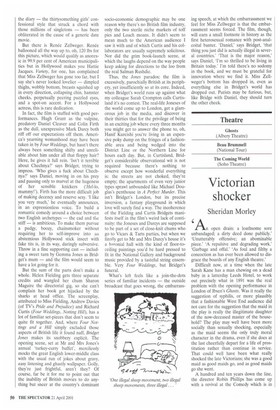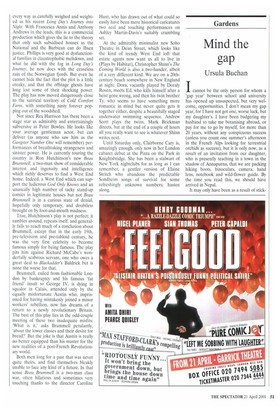Ghosts (Albery Theatre) Beau Brummell (National Tour) The Coming World (Soho Theatre)
Victorian shocker
Sheridan Morley
An open drain: a loathsome sore unbandaged; a dirty deed done publicly.' 'Unutterably offensive; an abominable piece.' A repulsive and degrading work.' 'Garbage and offal.' As foul and filthy a concoction as has ever been allowed to disgrace the boards of any English theatre.'
Difficult now, at a time when the late Sarah Kane has a man chewing on a dead baby in a latterday Leeds Hotel, to work Out precisely what in 1891 was the real problem with the opening performance in London of Ibsen's Ghosts. Was it really the suggestion of syphilis, or more plausibly that a fashionable West End audience did not care for the suggestion that the maid in the play is really the illegitimate daughter of the now-deceased master of the household? The play may well have been more socially than sexually shocking, especially as the maid seems the only truly moral character in the drama, even if she does at the last cheerfully depart for a life of prostitution rather than continue in service. That could well have been what really shocked the late Victorians; she was a good maid as good maids go, and as good maids go she went.
A hundred and ten years down the line, the director Robin Phillips has come up with a revival at the Comedy which is in every way as .carefully weighed and weighted as his recent Long Day's Journey into Night. With Francesca Annis and Anthony Andrews in the leads, this is a commercial production which gives the he to the theory that only such subsidised houses as the National and the Barbican can do Ibsen justice. Phillips is very good at dysfunctional families in claustrophobic meltdown, and what he did with the fog in Long Day's Journey, he now does with the ceaseless rain of the Norwegian fjords. But even he cannot hide the fact that the plot is a little creaky, and that the offstage ghosts have long lost some of their shocking power. The play has now moved dangerously close to the satirical territory of Cold Comfort Farm, with something nasty forever popping out of the woodshed.
Not since Rex Harrison has there been a stage star as admirably and entertainingly subversive as Peter Bowles. He looks like your average gentleman actor, but can deliver (as anyone who saw him as the Gangster Number One will remember) performances of breathtaking strangeness and sinister power. He is currently touring the country in Ron Hutchinson's new Beau Brummell. a two-man show of considerable interest and ingenuity and intelligence which richly deserves to find a West End home. Indeed, a West End which can support the ludicrous God Only Knows and an unusually high number of tacky stand-up comics in legitimate houses but not Beau Brummell is in a curious state of denial, hopefully only temporary, and doubtless brought on by foot-and-mouth madness.
True, Hutchinson's play is not perfect; it rambles around, repeats itself, and generally fails to reach much of a conclusion about Brummell, except that in the early 19th, pre-television and pre-tabloid century, he was the very first celebrity to become famous simply for being famous. The play pits him against Richard McCabe's wonderfully scabrous servant, one who owes a great deal to Blackadder's Baldrick but is none the worse for that.
Brummell, exiled from fashionable London by bankruptcy and his famous 'fat friend' insult to George IV, is dying in squalor in Calais, attended only by the equally misfortunate Austin who, imprisoned for having mistakenly joined a minor workers' rebellion, now has dreams of a return to a newly revolutionary Britain. The best of this play lies in the odd-couple meeting of these two inadequate misfits: 'What is it,' asks Brummell petulantly, 'about the lower classes and their desire for bread?' But the joke is that Austin is really no better equipped than his master for the new realities of a post-French Revolutionary world.
Both men long for a past that was never quite theirs, and find themselves bleakly unable to face any kind of a future. In that sense Beau Brummell is a two-man class war, often hilarious and sometimes very touching thanks to the director Caroline Hunt, who has drawn out of what could so easily have been mere historical caricatures two real and touching performances on Ashley Martin-Davis's suitably crumbling set.
At the admirably minimalist new Soho Theatre in Dean Street, which looks like the kind of trendy West End loft that estate agents now want us all to live in (Plays by Habitat), Christopher Shinn's The Coming World is also a two-hander, albeit of a very different kind. We are on a 20thcentury beach somewhere in New England at night: Dora, vacantly played by Doraly Rosen, meets Ed, who kills himself after a heist gone wrong, and then his twin brother Ty, who seems to have something more romantic in mind but never quite gets it together either, despite a beautifully staged underwater swimming sequence. Andrew Scott plays the twins, Mark Brickman directs, but at the end of a couple of hours all you really want to see is whatever Shinn writes next.
Until Saturday only, Clairborne Cary is, amazingly enough, only now in her London cabaret debut at the Pizza on the Park in Knightsbridge. She has been a stalwart of New York nightclubs for as long as I can remember, a gentler version of Elaine Stritch who abandons the predictable Sondheim songs of survival for some refreshingly unknown numbers; hasten along,



































































 Previous page
Previous page